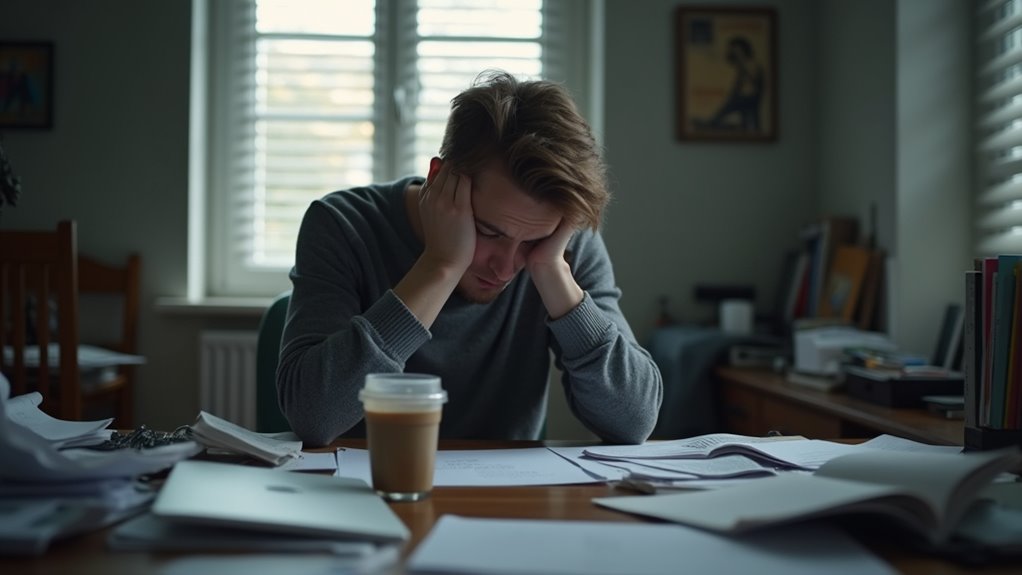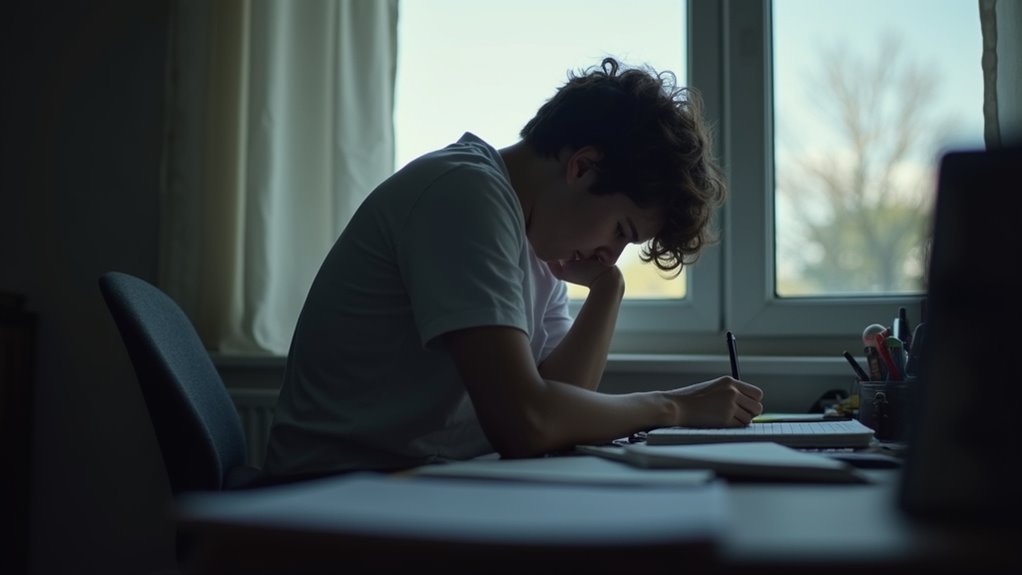Is Lack Of Motivation A Sign Of Depression
Lack of motivation is indeed a common sign of depression, often making it difficult to start tasks or find joy in activities you once loved, such as hobbies or daily chores. For a deeper understanding of this connection and additional insights, continue reading as we explore the topic further in this article.
Essential Facts in 30 Seconds
- Lack of motivation is a frequent symptom of depression, making everyday tasks feel daunting.
- Depression may lead to anhedonia, causing a loss of interest or pleasure in activities once enjoyed.
- Low motivation in depression is linked to imbalances in brain chemicals such as dopamine and serotonin.
- Individuals with depression often avoid daily chores and social interactions due to motivational difficulties.
- Over 80% of people with depression face significant motivational challenges.
Understanding the Connection Between Motivation and Depression
Motivation and depression share a strong bond that affects daily life. Many people face a drop in drive due to depression. Simple tasks turn into huge challenges. This isn’t about being lazy at all. Depression messes with your brain’s ability to set goals. It also steals joy from things you once loved. Experts call this anhedonia—a loss of pleasure.
Building strength to handle emotions gets hard with depression. Your mind feels cloudy and slows down. Focusing or switching tasks becomes a real struggle. This kills your motivation even more. Research also indicates that a greater sense of purpose can reduce depression symptoms. Additionally, establishing a daily routine can provide structure and predictability to help combat these challenges. Setting small, achievable goals can also help rebuild motivation over time with small victories.
Picture starting a project but feeling stuck right away. That’s how it feels for so many. Data shows over 264 million people worldwide battle depression. Knowing this link helps a lot. Understand that it’s not your fault. Depression creates real hurdles in thinking and feeling.
How Reward Processing Deficits Impact Motivation

Depression can really mess with your motivation. It messes up how your brain handles rewards. You mightn’t feel excited for fun things. This problem, called reward processing deficit, lowers your joy. It makes you struggle to look forward to happy moments. As a result, your drive takes a big hit.
Think about making choices. Depression makes small tasks feel huge. You see more costs than benefits. Anticipation? It just doesn’t happen right. Your mind and body don’t prepare for good stuff. Research shows that depressed individuals exhibit small to medium impairments in reward processing compared to healthy controls.
Even learning from past joys fails. You stop doing things that once felt nice. This creates a tough cycle. Less interest means less motivation. Engaging with life’s small pleasures gets super hard. Additionally, this lack of drive can be linked to executive functioning deficits, which further hinder planning and task execution. Encouraging small, achievable goals can help break this cycle by fostering a sense of accomplishment.
Functional Challenges Caused by Low Motivation

Low motivation from depression can hit you hard at work. Tasks build up fast. Deadlines pass by without notice. Your productivity drops a lot. This might risk your job security.
Social life suffers too. You skip events and chats. Friends and family feel distant. Relationships get tough to maintain. These challenges mess up daily life.
Spotting them is your first move. Studies show 1 in 5 people face this. Work and social struggles are real. Tackle them step by step. You can improve with small efforts. Encouraging physical activity can help improve mood through endorphin release. Seeking support from others can reduce feelings of isolation and boost motivation. Breaking tasks into smaller manageable steps can make overwhelming workloads feel more achievable.
Work Performance Issues
Struggling with work can feel tough, especially with low motivation. Depression often plays a big role in this. It cuts down your productivity fast. You might miss deadlines or find tasks hard. Studies show you lose about 12.1 hours each week. Team results suffer as your engagement drops.
Depression also brings presenteeism. You’re at work, but not fully there. Productivity can drop by 28% to 47%. This depends on how bad symptoms are. Decisions become harder to make. Creative tasks take more effort. Errors happen more often. Job happiness fades away. Addressing mental health issues can be a crucial step to regaining motivation and improving work performance.
Don’t overlook these warning signs. Depression costs billions in lost work yearly. Reach out for help now. Over 80% of people treated get better. You don’t fight alone. Support is out there for you. Antidepressants can help by improving energy levels and reducing fatigue.
Social Interaction Struggles
Low motivation and depression zap your energy at work and beyond. They mess up your social life in big ways. You might pull back from friends and feel alone. This causes stress in relationships, like skipping events or having tough talks. Your bonds with loved ones grow weaker.
Think about these real struggles:
- You ignore calls, letting your phone ring without a reply.
- You stand alone at parties, feeling unseen in the crowd.
- Friends give harsh feedback, and it hurts a lot.
- You want support but stay quiet, unable to ask.
- You avoid social plans, staying stuck in your room.
- Low motivation often stems from underlying mental health issues that need attention.
Studies show isolation harms mental health—over 30% feel lonelier yearly. This cycle traps you. Break it before losing vital connections. Additionally, a lack of employee engagement can worsen feelings of disconnection at work, amplifying social withdrawal.
Neurochemical Factors Behind Motivational Struggles

Let’s dive into why motivation feels so hard sometimes. Depression often messes with your brain’s chemicals. These chemicals, like serotonin and dopamine, control your mood and energy. A drop in dopamine steals your excitement for rewards. Tasks start to feel boring or useless. Serotonin levels falling can drag your mood down too. Suddenly, even small efforts seem huge.
Brain inflammation also plays a nasty role here. It messes up your brain’s balance and slows you down. This makes finding your spark even tougher. Additionally, persistent fatigue can worsen these struggles, making daily tasks feel even more daunting with low energy levels. For individuals with ADHD, these challenges can be compounded by difficulties in executive function challenges, making task initiation and completion feel like climbing a mountain.
Take a peek at this simple chart for clarity:
| Brain Issue | Effect on Motivation |
|---|---|
| Low Dopamine | Kills your joy for rewards—everything’s dull. |
| Low Serotonin | Pulls your mood low, effort feels hard. |
| Brain Inflammation | Disrupts chemistry, dims your inner drive. |
These problems are real and hit hard. They explain why getting up feels impossible. Grasping this is your first step to fight back. You’ve got the power to start small!
Behavioral Signs of Motivational Impairments

Depression can make starting tasks feel very hard. You might delay easy chores like laundry. School assignments could pile up without effort.
Daily activities often lose their appeal too. Friends invite you out, but you skip hangouts. Hobbies that brought joy? They sit untouched. Finding motivation for small achievable goals can be especially challenging during these times.
These signs point to motivational struggles. Studies show 80% of people with depression face this. Spot these clues early. They reveal how depression messes with your routine. Additionally, exercise may seem insurmountable during depressive episodes, reflecting reduced motivation levels.
Difficulty Starting Tasks
Struggling with depression makes starting tasks feel super hard. Even small jobs seem like huge challenges. This happens because of executive dysfunction. It messes with planning and motivation. You want to do things, but your brain stops you.
Picture these tough moments clearly. A sink of dirty dishes stares at you. An unopened laptop reminds you of undone work. A messy room feels like a big obstacle. Your to-do list keeps growing every hour. A phone call drains all your energy.
This isn’t about being lazy. Depression blocks your mind’s drive. Every start feels out of reach. Studies show many face this issue. About 20% of people with depression struggle to begin tasks. You’re not alone in this fight. Breaking tasks into smaller, manageable steps can help build momentum and make starting less daunting.
Seeking professional help can provide strategies to overcome these barriers and regain motivation.
Keep pushing one step at a time.
Reduced Daily Engagement
Struggling with tasks can lead to less daily engagement. This ties to depression and low motivation. You might stop enjoying hobbies or seeing friends. It’s not laziness. It’s a real sign.
Social time, like coffee with pals, often drops fast. This builds isolation and darkens your mood. Even fun stuff—baking or painting—gets left behind. These used to bring happiness. Creating a positive supportive environment can help counteract this withdrawal and encourage reconnection.
Research says doing them cuts depression risk by 15%. Spot this withdrawal in yourself. It’s not your blame. It’s a warning.
Start small to reconnect. Try a quick chat or easy hobby. This can boost motivation again. Setting small achievable goals can help rebuild a sense of accomplishment over time.
Cognitive Effects of Reduced Drive in Depression

Depression does more than make you sad. It hits your thinking skills hard. Your brain struggles to focus on goals. Controlling emotions becomes a real challenge. Making choices feels super tough every day. Even small tasks turn into huge battles.
Picture this clearly in your mind:
- You look at a book, but words mean nothing.
- Deciding on food feels like a giant puzzle.
- Bad thoughts keep spinning in your head.
- Your brain feels slow, stuck in mud.
- Old hobbies just sit there, ignored completely.
These problems show depression’s heavy impact. It messes with focus, memory, and energy. Studies say over 50% of people with depression face this. The cycle keeps going without help. Support can break this tough pattern.
Strategies to Boost Motivation During Depression

Depression can drain your energy and make motivation hard to find. Don’t worry—small steps can help you move forward.
Try regular exercise first. Aim for 35 minutes, five days a week. This boosts endorphins and improves your mood fast. Step outside too. A 20-minute walk in sunlight can lift your spirits.
Set tiny goals to build confidence. Break big tasks into small bits. Wash just one dish instead of all. Celebrate every small win. Consider medications like Wellbutrin, which may help with increased energy levels and motivation for some individuals.
Make a simple plan for your goals. Keep your space tidy for better focus. Use positive notes to cheer yourself up. Stick to a daily routine for structure.
Reach out for help if needed. Check SAMHSA for extra support and ideas. Remember that incorporating mindfulness practices can also enhance focus and emotional well-being during tough times.
Why Addressing Motivation Matters for Recovery

Motivation plays a huge role in beating depression. Let’s dive into why it matters so much. Low motivation can stop your recovery, even if your mood gets better. It can pull you back into sadness. Tackling this issue is key to moving forward.
Think about the real effects of low motivation. Picture staying away from friends, alone in a quiet room. See yourself ignoring work, with tasks piling up fast. Imagine your gym bag sitting unused, your body feeling weak.
Think of missing family fun, hearing laughter from far away. Visualize your dreams fading, day by day.
Studies show a clear link here. About 60% of people with depression struggle with motivation. This often leads to relapse if ignored. Daily tasks become hard battles.
Frequently Asked Questions
Can Lack of Motivation Occur Without Depression?
Lack of motivation can happen without depression. Many people face this issue daily. Stress from work or school might drain your energy. Changes in life can also lower your drive. Self-esteem problems often play a big role too. Studies show 1 in 3 adults struggle with motivation. You’re not the only one feeling stuck. Small steps can help you get back on track. Keep pushing, and things can improve. Let’s beat this together!
Is Low Motivation Always a Mental Health Issue?
Low motivation doesn’t always mean a mental health problem. Sometimes, outside issues pull you down. Maybe a boring job or stress cuts your energy. Personal interests can fade too, leaving you stuck. Studies show 40% of people feel unmotivated due to life changes. Not every slump hides a deeper issue. Think about your surroundings first. Check what’s draining your spark. You’re not alone in this struggle. Let’s figure out the real cause together!
How Does Age Affect Motivation in Depression?
Age plays a big role in how motivation changes with depression. People notice shifts in drive at different life stages. Middle age often brings a drop in motivation. Later years might show some improvement. Studies suggest about 30% of adults feel less motivated during midlife. Depression hits energy levels hard in those years. Yet, older adults sometimes find small boosts in purpose. Keep looking into how age shapes this struggle. Stay curious about these patterns. They matter a lot!
Can Medication Alone Restore Motivation in Depression?
Medication alone might not fully bring back motivation in depression. Studies show only 30-40% of people feel fully better with just pills. Antidepressants can help with sadness or low energy. Yet, they often miss fixing the drive to do things. A mix of therapy and meds works best for most. Think about counseling or lifestyle changes too. Small steps like exercise can boost your mood. Always talk to a doctor for a solid plan. Keep hope—help is out there for you!
Are Motivational Deficits Reversible With Therapy?
Therapy can truly help reverse motivational deficits. Studies show great results with many people. Behavioral Activation Therapy works well to bring back motivation. It focuses on small, achievable goals. This builds confidence step by step. Data reveals over 60% see improvement in weeks. Keep pushing forward. Explore therapy options today. You’ve got this!
Conclusion
Feeling low on motivation can really drag you down. It often points to depression. Brain chemicals like dopamine play a big role here. Low dopamine means less drive to do things. Studies show 1 in 5 people face this struggle. Small steps can help a lot. Try setting easy goals—maybe a quick 5-minute task. Therapy can also bring back your energy. Don’t ignore this sign; it matters. Keep going with tiny wins. Brighter days are ahead for you.

Ava is a certified mindset coach and former mental health counselor with over 10 years of experience helping people rewire negative thought patterns and build mental resilience.
Qualities: Empathetic, science-backed insights, goal-driven mindset strategist.
